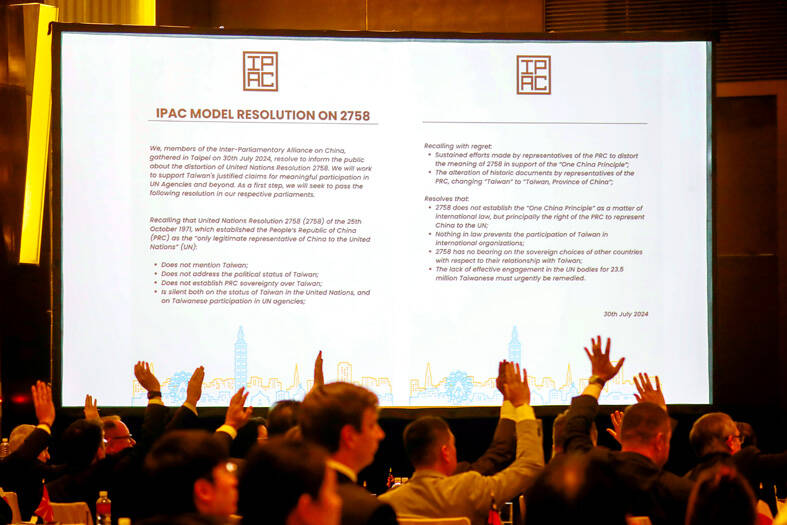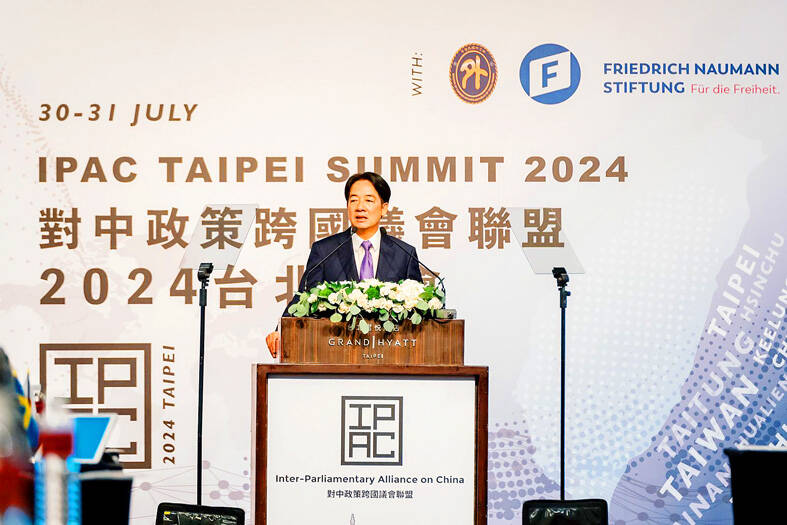China has falsely linked UN General Assembly Resolution 2758 with its “one China principle” and used the resolution to legitimize its acts to limit Taiwan’s participation in world bodies and possibly invade Taiwan by force, President William Lai (賴清德) said at the annual meeting of the Inter-Parliamentary Alliance on China (IPAC) in Taipei yesterday.
UN Resolution 2758 was passed by the UN General Assembly on Oct. 25, 1971, stating that the People’s Republic of China (PRC) is the legitimate government of China, which led to the PRC replacing the Republic of China (ROC), Taiwan’s official name, in the UN.
Beijing’s “one China principle” asserts that there is only one China, which is the PRC and not the ROC, and that it has jurisdiction over Taiwan.

Photo: EPA-EFE
Lai also thanked the US government and the European Parliament for repudiating China’s attempts to link the resolution and its “one China principle.”
Meanwhile, Taiwan was formally welcomed yesterday as an official IPAC member at the group’s annual meeting.
“Taiwan will do its best to put out a democratic protection umbrella with our democratic partners to keep them away from the threat of authoritarianism,” Lai said.

Photo courtesy of the Inter-Parliamentary Alliance on China
The president said Taiwan hopes to realize this goal by adhering to the “four pillars.”
Lai in an op-ed in the Wall Street Journal in July last year defined the pillars as building up the nation’s defense capabilities, promoting economic security and fostering supply chain resilience, forming partnerships with other democracies, and maintaining steady and principled cross-strait leadership.
Taiwan is resolute in its determination to maintain regional peace and stability, and deeply believes that peace and stability in the Taiwan Strait are linked with the development of global democracy, he said.
Lai cited recent Chinese aggression in the East and South China seas, and its joint military exercises with Russia as evidence of threats posed by autocratic expansion, while also citing this year’s NATO summit declaration that “China has become a decisive enabler of Russia’s war against Ukraine.”
During the meeting, all IPAC members agreed that China has distorted UN Resolution 2758 in their home nations and also agreed to enact efforts to support Taiwan’s participation in UN bodies.
The IPAC session stated that the 1971 resolution only confirmed that the PRC was China’s legal representative to the UN. It did not mention Taiwan or its political status, support China’s claims toward Taiwan or explicitly comment on Taiwan’s capability to join the UN and related bodies.
It is regrettable that China has distorted the meaning of Resolution 2758 to imply that it supports China’s “one China principle,” and equally regrettable to see China altering historical documents, changing references to “Taiwan” to “Taiwan, China.”
Separately, at a Ministry of Foreign Affairs banquet on Monday, IPAC chair Olivier Cadic said China’s recent guidelines targeting Taiwan might be in violation of UN human rights principles.
Cadic also called on China to stop its irresponsible and aggressive military actions, and to respect the rights of free passage to all ships sailing through the Taiwan Strait and the South China Sea.
Deputy Minister of Foreign Affairs Tien Chung-kwang (田中光) thanked IPAC for raising international awareness about Chinese efforts to undermine the international order, as well as those of members of the G7 and the G20.

ACTION PLAN: Taiwan would expand procurement from the US and encourage more companies to invest in the US to deepen bilateral cooperation, Lai said The government would not impose reciprocal tariffs in retaliation against US levies, President William Lai (賴清德) said yesterday, as he announced five strategies to address the issue, including pledging to increase Taiwanese companies’ investments in the US. Lai has in the past few days met with administrative and national security officials, as well as representatives from various industries, to explore countermeasures after US President Donald Trump on Wednesday last week announced a 32 percent duty on Taiwanese imports. In a video released yesterday evening, Lai said that Taiwan would not retaliate against the US with higher tariffs and Taiwanese companies’ commitments to

‘SPECIAL CHANNEL’: Taipei’s most important tasks are to stabilize industries affected by Trump’s trade tariffs and keep negotiations with Washington open, a source said National Security Council Secretary-General Joseph Wu (吳釗燮) arrived in the US for talks with US President Donald Trump’s administration, a source familiar with the matter said on Friday. Wu was leading a delegation for a meeting known as the “special channel,” the Financial Times reported earlier. It marked Trump’s first use of the channel since returning to the White House on Jan. 20. Citing a source familiar with the matter, the Financial Times reported that Minister of Foreign Affairs Lin Chia-lung (林佳龍) was also a part of the delegation. The visit came days after China concluded war games around Taiwan and amid Trump’s

Intelligence agents have recorded 510,000 instances of “controversial information” being spread online by the Chinese Communist Party (CCP) so far this year, the National Security Bureau (NSB) said in a report yesterday, as it warned of artificial intelligence (AI) being employed to generate destabilizing misinformation. The bureau submitted a written report to the Legislative Yuan in preparation for National Security Bureau Director-General Tsai Ming-yen’s (蔡明彥) appearance before the Foreign Affairs and National Defense Committee today. The CCP has been using cognitive warfare to divide Taiwanese society by commenting on controversial issues such as Taiwan Semiconductor Manufacturing Co’s (TSMC, 台積電) investments in the

HELPING HAND: The steering committee of the National Stabilization Fund is expected to hold a meeting to discuss how and when to utilize the fund to help buffer the sell-off The TAIEX plunged 2,065.87 points, or 9.7 percent, to close at 19,232.35 yesterday, the highest single-day percentage loss on record, as investors braced for US President Donald Trump’s tariffs after an extended holiday weekend. Amid the pessimistic atmosphere, 945 listed companies led by large-cap stocks — including Taiwan Semiconductor Manufacturing Co (TSMC, 台積電), Hon Hai Precision Industry Co (鴻海精密) and Largan Precision Co (大立光) — fell by the daily maximum of 10 percent at the close, Taiwan Stock Exchange data showed. The number of listed companies ending limit-down set a new record, the exchange said. The TAIEX plunged by daily maxiumu in just